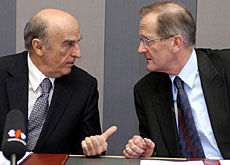Swiss take part in debate over IMF reform

Switzerland is to back calls for better representation for developing countries within the International Monetary Fund (IMF) at a meeting in Washington this weekend.
A high-ranking Swiss delegation is attending the joint spring session of the IMF and World Bank, where debates over reform are continuing.
Switzerland represents a voting group of eight countries within the World Bank.
For the Swiss finance and economics ministers, Hans-Rudolf Merz and Joseph Deiss, the gathering is an occasion to analyse current economic difficulties, notably the deficits run up by the United States.
But above all it’s a chance to examine the work carried out by the IMF and World Bank, the two pillars of the global economic and financial systems.
On the agenda is discussion of the new IMF strategy, proposed by managing director Rodrigo de Rato. The institution wants to improve its monitoring of exchange rates – one of its key tasks.
“It is a difficult task owing to the sensitivity of the financial markets, but Switzerland supports this approach. Improving transparency and monitoring is important,” explained Paul Inderbinen, the head of the IMF and International Finance Division within the Federal Finance Administration.
Reform mandate
As part of the discussion over strategic development, the ministers will examine crisis resolution. They will also consider a call by developing countries for an instrument to improve access to financial aid.
“We are sceptical,” said Inderbinen. “In view of the financial markets we have always underlined the importance of clear limits on IMF credits. This discussion will take time.”
On the sidelines of the meeting discussions are expected to focus on the delicate question of quotas for developing countries.
China, South Korea, Singapore and others would like greater representation within the IMF. This is also the wish of de Rato, who is expected to receive a mandate to present a reform plan.
“In principle Switzerland is open to a selective increase [in members],” Inderbinen indicated. “The institution functions on the basis of its legitimacy which depends on an adequate representation of countries (but the current formulas for calculating representation should be maintained).”
Differences of opinion
On the World Bank side the ministers will discuss a set of measures dealing with energy and the climate. They are also set to approve the debt relief initiative announced by 19 countries last year.
A possible sticking point is the third report on the United Nations Millennium Goals (poverty reduction), which is being discussed amid controversy over the management style of the new World Bank president.
“Paul Wolfowitz has made serious efforts to tackle corruption. But these efforts should not be ad hoc, rather they must be made within a strategic framework which applies to all countries,” said Pradeep Itty of the Swiss Development Agency.
“Respect for human rights and international conventions is also very important,” he said, in reference to the hundred-million-dollar credits cancelled by the bank in recent months as a result of corruption.
The bold style of the arch conservative Wolfowitz has caused waves inside and outside the financial institution.
For Itty this is a clear sign of “the need for clear rules, which have been discussed and agreed by the bank’s board”. “We hope that the different parties will find their place,” he added.
swissinfo, Pierre-François Besson
The spring meetings of the IMF and World Bank are being held in Washington on April 22 and 23.
The Swiss delegation is led by Finance Minister Hans-Rudolf Merz.
The economics minister, Joseph Deiss, and head of the Swiss National Bank, Jean-Pierre Roth, are also attending.
Switzerland has been a member of the World Bank and the International Monetary Fund since 1992.
The country sits on the executive boards of both institutions and leads a voting group which includes Azerbaijan, Uzbekistan, Kyrgyzstan, Poland, Serbia-Montenegro, Tajikistan and Turkmenistan.
The World Bank provides loans, technical assistance and institutional advice, while the IMF promotes monetary cooperation, financial stability and crisis prevention.

In compliance with the JTI standards
More: SWI swissinfo.ch certified by the Journalism Trust Initiative










You can find an overview of ongoing debates with our journalists here . Please join us!
If you want to start a conversation about a topic raised in this article or want to report factual errors, email us at english@swissinfo.ch.